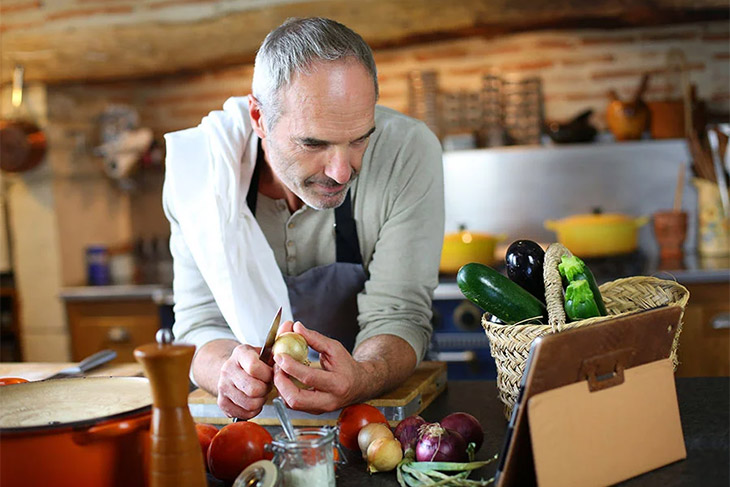Eat the right diet for your age

If there was a magic anti-ageing pill that could prevent brittle bones, loss of muscle mass and the risk of type 2 diabetes, many of us would probably be less vigilant with our diet and lifestyle choices. After all, where’s the fun in eating greens and stretching every day?
The reality, however, is that eating a balanced diet, as well as exercising regularly, play a big part on how well (or not so well) we age.
The importance of healthy diet
According to a study published in the Medicine & Health Journal, eating a healthy diet consisting of appropriate composition and kilojoule intake is fundamental for optimal health. It’s also important in preventing diseases such as obesity, cardiovascular disease, diabetes, osteoporosis and some cancers.
So, while the fountain of youth is still beyond reach, there are several ways to optimise your health and diet based on your age.
Best diet for men and women over 30
Many women have families or are about to have a family in their 30s, so being conscious of what they eat and what impact that can have on their children is important. Professor Manny Noakes, Research Director for CSIRO's Food and Nutrition Flagship and co-author of the CSIRO Total Wellbeing Diet, says the quality of a mother’s diet can influence total wellbeing, which is why it’s crucial for mothers-to-be to eat a well-balanced healthy diet before and during pregnancy.
Important nutrients in your 30's
According to Professor Jennie Brand-Miller, President of the Glycemic Index Foundation, only 10 per cent of women get enough of the vital nutrients – iodine, folic acid, iron and omega-3 fatty acids – needed to ensure the best possible health of their offspring.
“The foods you eat should provide all the nutrients necessary for healthy reproduction,” says Professor Brand-Miller. Folic acid supplements, however, may be needed to support an already healthy diet and help prevent neural tube defects.
Planning and meal prep can also fall by the wayside in your 30s, especially for those juggling their careers and an active social life. “Get back to a healthy diet and prioritise a bit more,” advises Professor Noakes. “Go for healthier options when eating out, and definitely avoid fried, battered food and large portions.”
Best diet for men and women over 40
While 40 may be the new 30, there are important markers of health to watch out for to prevent the risk of chronic disease during this life stage.
“A general health, cholesterol and blood pressure check is important in your 40s,” advises Professor Noakes. “It’s good to get an idea of how you’re going so you can get yourself into gear. Physical activity and exercise is important for bone health during this time so check with your doctor if you might benefit from a bone scan.”
The 40s is also the “window of opportunity” for delaying the onset of diabetes, according to Professor Brand-Miller. “It’s the perfect time if you’re pre-diabetic to reverse it.
Being overweight is the biggest contributing factor to diabetes so the best thing to do to prevent that weight gain creep is something like the Total Wellbeing Diet, because managing a healthy weight will help prevent diabetes as well as cardiovascular disease,” says Professor Brand-Miller.
“They don’t have to go back to what they were at 25, but keeping a healthy weight can reverse pre-diabetes.”
Losing weight at 50
Similar to people in their 40s, weight gain is also a health concern for those in their 50s. Professor Brand-Miller says everyone in this life stage should make a concerted effort to do a mix of brisk walking, resistance exercise - such as squats, lunges and weights - and stretching every week, if not daily.
As we get older, these three forms of exercise become more critical,” says Professor Noakes. “Resistance exercise especially helps in maintaining muscle tissue which can deteriorate quickly the more time you spend sitting down.
Exercise is critical for women during menopause at this age, too. “Women can find they can gain about 4 kg despite their best efforts,” says Professor Brand-Miller.
One study measured the effects of exercise without dieting over 10 months and found that participants who burned 400 calories per cardio session 5 times per week lost 4.3% of their body weight. Those that burned 600 calories per session (also 5 times per week) were able to lose 5.7% body fat. Conversely, the control group, which didn’t exercise, actually gained 0.5% of their body weight.
In terms of diet at his life stage, it’s important to make sure you’re getting enough calcium to maintain bone strength. According to the Australian Dietary Guidelines our requirement for calcium increases as we age so we need extra serves of low fat milk, yogurt and cheese.
“As your hormones change, you tend to excrete more calcium in the urine. Check with your doctor if you need a calcium supplement in addition to taking dairy in your diet, and whether that supplement requires vitamin D. While women are more prone to osteoporosis than men, it’s important to note it does occur in men as well,” advises Professor Noakes.
Best diet for age 60 and over
As we get older we often need fewer kilojoules because we are less active than when we were younger. However, we still need a similar amount of nutrients, especially moderate amounts of protein.
Protein requirements over age 60
“A modestly higher protein intake, roughly 25% of your daily intake, like the one the Total Wellbeing Diet recommends, is ideal. So aim for 90 grams of protein a day and 45 per cent of carbs,” says Professor Brand-Miller.
Want to learn more about weight loss and high protein diets? Take a look in our comprehensive high protein guide!
Professor Noakes says a moderately higher protein diet, just like the CSIRO Total Wellbeing Diet, has been shown to decrease body weight and fat mass, retain lean muscle mass and provide greater satiety, helping to keep excessive treats at bay.
Can carbs age you faster?
On the other hand, a high carbohydrate diet can greatly affect the aging process. “It’s been shown that when people choose a moderately higher protein and low GI diet their whole dietary quality goes up. It’s like a shortcut to an all round healthy diet,” says Professor Brand-Miller.
Because a high GI diet is producing oxidative stress, with higher levels of inflammatory markers, you are accelerating the aging process, in every cell of the body.
Again, calcium and resistance exercise is crucial to ensure you keep your mobility and long-term independence.
